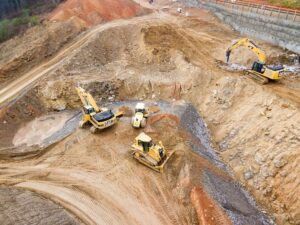Kentucky Demolition Services: Permits, Costs & Sustainable Practices
Demolishing a structure in Kentucky involves more than wrecking walls—it demands meticulous planning, strict compliance, and sustainable waste management. General contractors, builders, and project managers need clear guidance on residential demolition services, commercial demolition contractors, permit requirements, cost factors, and eco-friendly practices to deliver safe, efficient projects. This article unpacks the full spectrum of demolition offerings available across Kentucky, explains how to secure the right permits, breaks down cost influences, explores green demolition methods, and outlines the step-by-step process followed by local specialists. Along the way, discover why Earth Works, LLC’s expertise in excavation, civil works, and responsible waste disposal makes them a trusted partner for every scale of demolition project in Louisville, Lexington, and beyond.
What Types of Demolition Services Are Available in Kentucky?
Demolition services encompass a range of structural removal techniques designed to suit varying project scales and material compositions. Whether clearing old houses or dismantling industrial facilities, specialty processes ensure safety, efficiency, and regulatory compliance. Below is a structured overview of the main demolition categories in Kentucky.
What Is Commercial Demolition and Which Projects Does It Include?
Commercial demolition involves the systematic removal of business-use structures to prepare sites for redevelopment, renovations, or expansions. By combining heavy machinery with precise planning, this service ensures minimal disruption to neighboring properties and adherence to local zoning and safety standards. Typical commercial projects include office buildings, retail centers, and multi-unit complexes.
- Commercial demolition uses hydraulic excavators, shears, and wrecking balls.
- Specialized dust-control and noise-mitigation strategies protect surrounding operations.
- Site clearance includes sorting materials for recycling and landfill diversion.
Detailed commercial demolition bridges site preparation and final clearance, seamlessly transitioning to excavation and foundation work.
How Does Industrial Demolition Differ and What Are Its Key Features?
Industrial demolition targets large-scale facilities such as factories, warehouses, and plants that often contain heavy equipment, reinforced structures, and hazardous substances. This process demands advanced structural analysis and strict abatement protocols to manage risks and maintain environmental safety.
Selecting the right method for industrial demolition reduces downtime and protects worker safety, paving the way for site remediation and redevelopment.
What Are the Common Residential Demolition Services Offered?
Residential demolition service covers the dismantling of homes, garages, sheds, and ancillary features like pools or driveways. Defined by property size and material composition, these projects balance cost-effectiveness with minimal impact on neighbors.
- Full house teardown for rebuilding or land resale.
- Garage and outbuilding removal for accessory-structure clearances.
- Pool demolition including concrete break-up and excavation.
Each residential demolition engages utility disconnection, material sorting, and back-filling procedures to ready the lot for landscaping or new construction.
What Is Selective Demolition and How Does It Support Sustainability?
Selective demolition focuses on removing specific components—such as interior walls, fixtures, or roofing—while preserving the main structure. This precision approach reduces waste, lowers disposal fees, and allows materials like steel beams, copper wiring, and hardwood flooring to be reclaimed.
- Identify reusable materials during pre-demolition survey.
- Dismantle targeted elements manually or with small machinery.
- Separate salvaged items for donation or resale.
By capturing high-value materials, selective demolition aligns with eco-friendly mandates and lowers overall project costs.
How Do Demolition Permit Requirements Work in Kentucky?
Obtaining the correct demolition permits in Kentucky secures legal compliance and ensures public safety. Permit requirements vary by municipality, project scope, and the presence of regulated materials.
What Are the General Steps to Obtain a Demolition Permit in Kentucky?
- Submit permit application to local planning department with site plans.
- Provide documentation of utilities disconnection agreements.
- Schedule a pre-demolition inspection by city or county code enforcement.
- Obtain written clearance for asbestos and lead if applicable.
- Receive permit approval and post notice at the project site.
Completing each step in order prevents delays and fines, allowing demolition to proceed on schedule.
Kentucky Environmental Law Handbook: Compliance, Permits, and Waste Disposal
ABSTRACT: Authored by one of the nation’s foremost environmental law firms, this handbook offers concise, readily comprehensible explanations of your state compliance obligations. It provides comprehensive coverage of hazardous and solid waste disposal; air, water, and natural resources regulations; the state’s organisational structure; requisite permits and reports; the interplay between federal and state regulations; and more.
KENTUCKY
How Do Louisville and Lexington Demolition Permits Differ?
Louisville and Lexington share core permit requirements but differ in fee structures, submission portals, and inspection timelines. Louisville typically requires a zoning clearance letter, while Lexington mandates a separate erosion-control plan for sites over one acre. Awareness of local nuances speeds permit issuance and avoids administrative setbacks.
What Utility Disconnections Are Required Before Demolition?
Safe demolition necessitates shutting off key utilities to prevent hazards:
Proper coordination with utility companies secures safe working conditions and regulatory compliance.
What Are the Regulations for Hazardous Material Handling During Demolition?
Kentucky regulations mandate testing and abatement when asbestos, lead paint, or other hazardous materials exist. Certified inspectors perform surveys, and contractors follow containment, removal, and disposal protocols set by federal and state agencies. These measures protect workers, nearby occupants, and the environment from toxic exposure.
Removal of Hazardous Components Prior to Demolition: Policy and Contractor Responsibilities
Policy options for the removal of hazardous building components before demolition, demolition contractors, clients commissioning demolition, those issuing demolition permits, and demolition waste landfills. The paper also discusses hazardous waste batteries, demolition contractors involved in their handling, and the regulations governing their disposal.
Policy options for hazardous-building-component removal before demolition, TG Townsend, 2000
What Factors Influence Demolition Costs in Kentucky?
Understanding cost drivers enables accurate budgeting and informed contractor selection. Demolition pricing reflects structural complexity, material types, waste management, and site access conditions.
How Does Structure Type Affect Demolition Pricing?
Demolition costs vary significantly by structure category:
- Single-family homes: simpler layouts and lighter materials reduce labor and equipment expenses.
- Multi-unit complexes: increased demolition volume and additional safety measures raise costs.
- Industrial facilities: heavy gating, reinforced steel, and hazardous abatement drive up pricing.
Project accessibility, foundation depth, and local disposal fees further influence final estimates.
What Are the Average Costs for House, Garage, and Pool Demolition?
Below is a regional cost breakdown for common residential projects in Kentucky:
Accurate site assessments are essential to refine these averages into an exact quote.
How Do Commercial and Industrial Demolition Costs Compare?
Commercial structures generally cost between $5 and $10 per square foot, depending on height and materials used, whereas industrial sites can exceed $30 per square foot when specialized equipment and abatement protocols are required. Bulk volume, salvage value, and site remediation requirements also differentiate pricing between these sectors.
How Can You Get an Accurate Demolition Cost Estimate?
Requesting a tailored estimate involves a site visit by experienced contractors who assess structural details, material volumes, and waste management needs. Earth Works, LLC offers free on-site consultations to provide precise quotes and identifies excavation or site-preparation requirements as part of a comprehensive civil works package.
What Are Eco-Friendly Demolition Practices in Kentucky?
Eco-friendly demolition minimizes landfill impact and promotes a circular economy by recovering and recycling materials. Sustainable methods also reduce disposal costs and align with green building standards.
How Does Demolition Waste Recycling Work and Why Is It Important?
Recycling demolition debris involves sorting concrete, wood, metals, and masonry on-site or at dedicated sorting facilities. Reclaimed materials can be processed into aggregate for new construction or resold, significantly diverting waste from landfills and lowering carbon footprints.
- Concrete crush to produce road base aggregate.
- Metal alloys sorted by composition and sold to recyclers.
- Deconstructed wood milled into flooring or landscaping mulch.
Prioritizing recycling improves sustainability metrics and may qualify projects for green building incentives.
What Are Deconstruction Services and Their Environmental Benefits?
Deconstruction is the manual dismantling of a building component by component to maximize material recovery. This labor-intensive process enables up to 85% of structural elements to be salvaged, lowering disposal volumes and preserving resources.
- Manual removal of doors, windows, and fixtures.
- Salvage of framing lumber and architectural details.
- Donation or resale of high-value items to local charities.
Adopting deconstruction supports local reuse economies and reduces embodied carbon.
How Is Hazardous Material Abatement Managed Safely and Responsibly?
Safe abatement follows stringent containment, removal, and disposal procedures for asbestos, lead paint, and other toxins. Certified teams erect negative-pressure enclosures, use HEPA-filtered vacuums, and transport waste to licensed disposal facilities, preventing airborne contamination and environmental release.
What Are the Latest Trends in Sustainable Demolition Technologies?
Advancements in eco-friendly demolition include robotic dismantling systems that reduce manual labor, AI-driven site assessment tools that optimize waste recovery strategies, and 3D scanning for accurate material volume forecasting. These innovations increase efficiency, enhance safety, and deepen recycling rates.
What Is the Typical Demolition Process Followed by Kentucky Contractors?
A structured workflow ensures projects proceed smoothly from assessment through site restoration. Following a proven sequence minimizes risk and optimizes resource use.
How Is Site Assessment and Preparation Conducted Before Demolition?
Pre-demolition assessment defines project scope, identifies hazardous materials, and evaluates structural integrity. Contractors secure permits, disconnect utilities, and install erosion-control measures before mobilizing heavy equipment. This foundation sets the stage for efficient demolition with minimal surprises.
What Safety Protocols Are Implemented During Demolition Projects?
Contractors enforce rigorous safety standards including perimeter fencing, dust suppression, daily equipment inspections, and on-site safety officers. Personal protective equipment, designated exclusion zones, and emergency response plans protect workers and the public throughout the demolition phase.
How Is Demolition Waste Collected and Disposed of Properly?
Waste streams are segregated into recyclables, hazardous materials, and general debris. Recyclable concrete and metals are sent to processing yards, hazardous substances to certified disposal facilities, and remaining materials to licensed landfills. This disciplined approach meets regulatory requirements and supports environmental objectives.
What Are the Final Steps in Site Clearance and Restoration?
Once demolition concludes, crews perform final grading, back-fill excavations, and install erosion-control barriers. Compacted soil is tested for stability and the cleared site is left ready for new construction or landscaping. Comprehensive site clearance completes the civil works cycle, delivering a safe, build-ready land parcel.
Why Choose Earth Works, LLC for Demolition Services in Kentucky?
Selecting a demolition partner with local expertise and a full civil works portfolio ensures seamless project delivery from teardown through site preparation.
What Experience and Safety Standards Does Earth Works, LLC Follow?
Earth Works, LLC combines decades of collective team experience with OSHA-aligned safety protocols for every demolition. Detailed safety planning, certified abatement crews, and rigorous training underpin their commitment to incident-free operations across residential, commercial, and industrial sites.
How Does Earth Works, LLC Ensure Efficient and Responsible Waste Management?
By integrating waste recovery strategies—such as on-site sorting, concrete crushing, and material deconstruction—Earth Works, LLC maximizes recycling rates and minimizes landfill contributions. These practices reduce disposal costs and support clients’ sustainability goals.
What Client Testimonials and Case Studies Highlight Our Success?
Past projects showcase successful outcomes: a downtown Louisville office teardown with 75% material recovery, a Lexington industrial plant removal under strict abatement controls, and a portfolio of residential demolitions completed on time and on budget. These case studies demonstrate Earth Works, LLC’s reliable performance and client satisfaction.
How Can You Contact Earth Works, LLC for a Demolition Quote?
To receive a detailed, no-obligation estimate for your demolition or site-preparation needs, reach out via kyearthworks.com or call the office to schedule an on-site consultation. Expert guidance and precise cost forecasting are just one inquiry away.
What Are Common Questions About Demolition Services in Kentucky?
Kentucky project managers frequently ask about pricing, permits, hazardous abatement, and waste disposal. Below are concise, expert-level answers that address these core concerns.
- How much does it cost to demolish a house in Kentucky? The average cost ranges from $9,200 to $19,500, depending on home size, materials, and presence of a basement.
- What permits are needed for demolition projects in Kentucky? You must secure a demolition permit from local planning departments, submit asbestos and lead surveys, and provide utility disconnection clearances.
- How is asbestos removed during demolition? Certified abatement crews contain, remove, and transport asbestos under negative pressure protocols, disposing of waste at licensed facilities.
- What are eco-friendly demolition methods? Sustainable approaches include material recycling, deconstruction services, and on-site sorting to divert debris from landfills.
- How do you dispose of demolition waste responsibly? Waste is separated into recyclables, hazardous, and general debris streams, then processed at recycling yards or certified disposal sites in compliance with environmental regulations.
Demolition in Kentucky demands expertise, regulatory know-how, and a sustainability mindset. With a clear understanding of service types, permit pathways, cost drivers, green practices, and procedural workflows, contractors and owners can plan projects confidently. Earth Works, LLC’s comprehensive offerings in excavation, site clearance, and responsible waste management make them a reliable demolition partner across Kentucky’s residential, commercial, and industrial sectors.


